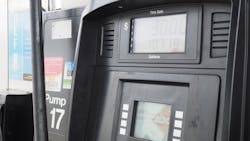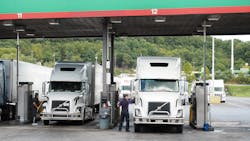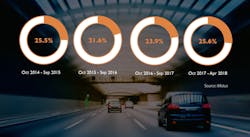Cheap fuel over the last three years has had its effect: pickups, SUVs, and larger vehicles have been disappearing off dealer lots while smaller, more economical car sales in many cases have languished. Fleets have found truck fuel efficiency technologies harder to justify with slower ROI. Are we on a collision course with fuel prices?
Fuel costs suddenly reached a higher point this month than Americans have seen for some time, and those totals at the pump have begun to stand out again. A unique supply-demand dynamic has been evolving behind the scenes.
Ultra-low sulfur diesel, which is powering many of those fleet trucks and popular pickups, spent four years at an average $4 a gallon from 2011-2015, then pitched down to half that over the following year. It's been inching back up ever since and is now in the low $3.20s, according to the U.S. Energy Information Administration (EIA).
Charting gasoline's average cost, on the other hand, looks a little more like an EKG readout over that timeframe, but a gallon of Regular 87 actually dipped into a free-for-all average in the $1-and-change zone in 2016 before a fairly steady rise. This month it reached the $3/gal. mark before easing back slightly.
It's enough that people have been noticing, and that's just an average cost—for many areas, prices are commonly in the $3.20s and higher, just like diesel.
So what's likely to happen with fuel costs now? A report from Motus, a provider of employee fuel use tracking and reimbursement software, analyzes some of the trends and cost factors over the last several years and attempts to predict what's to come.
Setting the stage
There's an underlying interplay of economy and infrastructure at work. More trucks and larger vehicles have flooded onto often-teeming U.S. roads both by people's personal choices and—concerning the larger commercial delivery and distribution trucks—to meet growing e-commerce and logistics needs. It raises fuel demand overall and makes roadways more congested and strained.
A strong economy is also contributing to more vehicles on the road and greater fuel demand, Motus' report notes, with low unemployment leading to more people commuting to work.
While they're earning, they're also more able to spend, and people have been more likely to travel and take trips with prices of fuel low in recent years. Americans racked up another 724 billion miles on the roadways in 2017 alone, an increase of nearly 2% overall, according to Motus.
In a larger sense, the state of the world economy and global development come to bear on fuel costs, the report points out. The company cites an example of one fast-developing nation: "From 2015 to 2018, China's fuel consumption has increased by an average of 510,000 barrels per day."
The supply side of things is complicated, but the largest portion of fuel prices is the cost of crude oil from which it's refined.
In response to an oil surplus in 2015-2016, the Organization of Petroleum-Exporting Countries (OPEC) and Russia cut back their oil production, the report notes. By the end of 2017, however, the United States' oil production grew significantly to equal and then surpass that of Saudi Arabia.
"The U.S. contribution has helped stabilize the oil market by filling gaps in supply, keeping prices at the pump affordable" even with oil production down from OPEC members and other oil-producing nations, the Motus report states.
What's to come
What's the verdict? There's higher demand for fuel and more—and larger—vehicles on the road, but also some resilience in global oil production to help keep up. As is typical throughout the rest of the summer, Americans can expect to see some higher costs at the pump.
That should taper off by the end of the year, but examining the data and input from market analysts, Motus predicts fuel costs will settle somewhat higher heading into 2019.
"This will increase the cost to own and operate a vehicle by up to 7% over the next year," the report authors surmise. So it may not be an immediate fuel cost shock we're heading for—as long as supplies can remain steady.
Even so, that cost-of-ownership increase would be significant and could influence vehicle purchasing and fuel use. Fuel has already been claiming a larger share as a percentage of vehicle ownership costs.
Since last October through April 2018, according to Motus, fuel reached an average of 25.6% of vehicle costs—the highest it'd been since 2015.
On the fleet side, where there are far more miles driven, diesel now accounts for some 61% of the total cost of ownership of a heavy-duty truck, according to Fleet Advantage, a fleet financing and business analytics provider. And that number is also on the rise.
About the Author
Aaron Marsh
Aaron Marsh is a former senior editor of FleetOwner, who wrote for the publication from 2015 to 2019.


